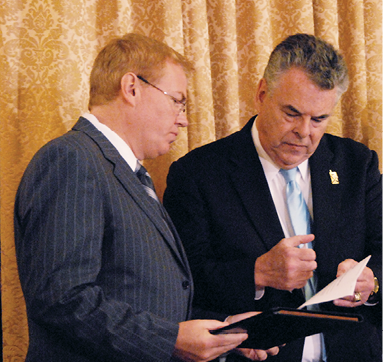
Of all the words to describe the pace at which the U.S. government typically operates, “swift” probably would not top most people’s lists. Yet Mike Russell, who has nearly three decades of federal service, would argue that when it comes to protecting its citizens and interests against terrorism, the government has been just that—swift.
In the post-9/11 world, U.S. national security has had to evolve rapidly, even haphazardly at times, and Russell is among the few to witness and impact the changes firsthand. “It was remarkable how quickly the federal government was reorganized after 9/11,” said Russell, who at the time of the attacks was on Capitol Hill serving as deputy chief of staff for Senator Ben Nighthorse Campbell of Colorado. “It was the biggest reorganization of government since the creation of the Defense Department after World War II, and it was done in about nine months.”
Russell himself had to adapt quickly to a new role shortly after 9/11—one that put him squarely in the middle of the reorganization. Appointed deputy assistant secretary of the Treasury Department by the Bush administration, he oversaw the budgets, policies and programs for 33,000 federal employees—including the Secret Service—as the enforcement bureaus for which they worked were transferred to the newly created Department of Homeland Security and Justice Department in 2003.
“The Treasury Department at that time had 40 percent of federal law enforcement,” he said. “When the president announced the Homeland proposal, we immediately worked on having our senior officials testify before Congress about what the implications of the new proposal would be. And then we spent late 2002 and early 2003 planning to move 33,000 employees out of the Treasury Department, which amounted to about one-third of the entire department, in a very expedited manner.”
Russell then returned to the Senate and spent two years as a subcommittee staff director on the Committee on Governmental Affairs, which oversaw Homeland Security. When the House granted its Homeland Security Committee permanent status in 2005, he was an obvious choice to serve as deputy policy director. Russell has spent the last eight years serving in various roles for the House Homeland Security committee, most recently as its majority staff director and chief counsel.
Dealing with policy related to domestic security is a complex job. The House Committee is divided into six subcommittees addressing border and maritime security; transportation security; counterterrorism and intelligence; emergency preparedness, response and communications; oversight and management; and cybersecurity and infrastructure protection. “We were fortunate to have one of the most bipartisan committees in the House,” he said.
During Russell’s tenure, the committee held hearings to investigate the causes and effects of radicalization, including the Fort Hood shooting rampage, multimillion-dollar DHS contracts, border security initiatives, and emerging terrorist threats. Russell also staffed congressional delegations to Guantanamo Bay, Central America, Africa, Europe and Asia, and conducted site visits to container ports in Singapore, Malaysia and Hong Kong.
Russell believes his time at Vanderbilt Law School was invaluable in preparing him for such a varied career in government. He particularly credits Professors Harold Maier and the late Jonathan Charney with expanding his understanding of international law. “My legal training at Vanderbilt has served me well every step of the way,” he said.
As he considers his next career move, most likely in the international arena, Russell is sure to continue following national security closely. He remains optimistic about future U.S. efforts to combat terrorism. “While our country is safer than it was on 9/11, we’re still under threat from al-Qaida and its affiliates, cyberattacks, and homegrown violent extremists,” he said. “The enemy is creative and evolving, but our government has shown that it too can be adaptive and creative in countering their tactics.”